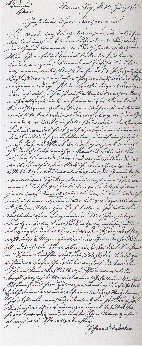|

|
|
Introduction - The kind of sources
|
Most of the families who emigrated to the New World were members of
the German peasantry. It is astonishing how often you can discover their
origin and their history. Normally, the first and most important hints
to find out the origin of your emigrated German ancestors can be found
in your old private family documents (e.g. old birth or marriage certificates,
census reports, emigration or immigration data). The emigration data
(the passenger lists from American Immigration Authorities) are also
available in some German Universities and Museums (as microfiches) and
in the World-Wide Web.
|
|
However, this information is only the first step into the past of your
ancestors' history. Meanwhile there are several computer database and
countless webpages which can be helpful to investigate the origin of
your ancestors. So, why do you need me as professional researcher? World-Wide
Web database and other genealogical webpages give you only a first orientation
and provide you with a lot of useful hints and contacts (e.g. www.familysearch.org
or www.genealogy.net).
But different families with the same names or a different spelling can
lead to wrong conclusions. And don't forget: Compared to all the parish
registers in Germany only a few of the data are available in the World-Wide
Web or in different databases. As a rule you have to spend a lot of
time in archives or in front of microfiche terminals if you want to
investigate your family history in a precise and reliable way. As mentioned
before sometimes you even have to look into the original church books
in the parish offices. In any case you must be able to read the German
handwritten entries which may only be poorly legible. Sometimes you
have unclear additions such as comments or abbreviations.
|
The most important source for birth/baptism, confirmation, marriage
and death/burial data and therefore for all genealogical and family
researchers are the German parish registers from both the main Christian
denominations (Roman Catholic and various Protestant religious groups).
Usually these entries are available as photocopy for a small fee. Records
vary greatly from one parish to another in quality and legibility. In
the parish registers you normally can find only data and only sometimes
some additional information. As a rule the human beings behind, their
fates you will not see. But with the help of a lot of other sources
you may find additional, new and interesting information concerning
your family history.
|
 |
|
One of the sources to mention are the record resources in governmental,
communal, and private archives. They can give information about the
living conditions of families, occupational activities, inheritance
matters, economic or health crisis, criminal offenses, too. Tax lists
and citizen records were often started earlier than the parish registers.
|
|
The first emigrants were mainly from rural areas of Germany, peasants
with various forms of land tenure and tenancy. As a rule these people
were in a dependent relationship to secular and clerical landlords.
If one can find such resources in the archives it is possible to trace
back the living conditions and everyday life of a peasant family over
a long period.
|
If you are interested in details
about the numbers of Germans who emigrated to the United States in the
19th century please click here.
|
|
It is not possible to describe here the very wide range of other sources
which might be used in my family history investigations. But I will
give you some examples of the most interesting and important sources:
Land register inventories, tombstone inscriptions, old farmhouses and
farm buildings, sometimes with inscriptions and initial letters of the
builder, old furniture with inscriptions, too, heraldic figures etc.
|
|

|
|




